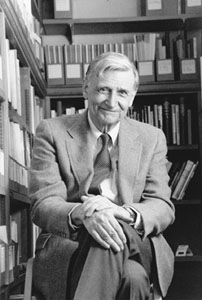 This Goodly Land
This Goodly Land
Edward O. Wilson (June 10, 1929–present)

Other Names Used
- Edward Osborne Wilson, Jr.: full name
- E. O. Wilson: name used academically
Alabama Connections
- Birmingham, Jefferson County: birthplace
- Evergreen, Conecuh County: brief childhood residence
- Mobile, Mobile County: father’s family home, brief childhood residence
- Brewton, Escambia County: brief childhood residence
- Decatur, Morgan County: brief childhood residence
- Tuscaloosa, Tuscaloosa County: education
Selected Works
- Wilson, Edward O. Sociobiology: The New Synthesis. Cambridge: Belknap Press of Harvard University Press, 1975.
- Wilson, Edward O. On Human Nature. Cambridge: Harvard University Press, 1978.
- Holldöbler, Bert, and Edward O. Wilson. The Ants. Cambridge: Belknap Press of Harvard University Press, 1990.
- Wilson, Edward O. The Diversity of Life. Cambridge: Belknap Press of Harvard University Press, 1992.
- Holldöbler, Bert, and Edward O. Wilson. Journey to the Ants: A Story of Scientific Exploration. Cambridge: Belknap Press of Harvard University Press, 1994.
- Wilson, Edward O. Naturalist. Washington, D.C.: Island Press for Shearwater Books, 1994.
- Wilson, Edward O. Consilience: The Unity of Knowledge. New York: Knopf, 1998.
- Wilson, Edward O. The Future of Life. New York: Alfred A. Knopf, 2002.
- Wilson, E. O. The Creation: An Appeal to Save Life on Earth. New York: Norton, 2006.
- Holldöbler, Bert, and Edward O. Wilson. The Superorganism: The Beauty, Elegance, and Strangeness of Insect Societies. New York: W. W. Norton, 2009.
Literary Awards
- Pulitzer Prize, General Non-Fiction, 1979, for On Human Nature
- Alabama Author Award, Alabama Library Association, 1980, for On Human Nature
- With Bert Holldöbler, Pulitzer Prize, General Non-Fiction, 1991, for The Ants
- Los Angeles Times Book Prize, Science and Technology, 1995, for Naturalist
Biographical Information
Edward O. Wilson was born in Birmingham, Ala., in 1929. After his parents’ divorce in 1936, Wilson spent most of his childhood living with his father and stepmother. The family moved frequently, making it difficult for Wilson to sustain friendships. He spent much of his free time exploring the natural environment, considering nature to be his first, truest friend. Wilson decided early to become a biologist, but a childhood fishing accident rendered him legally blind in one eye, and he suffered a substantial hearing loss during adolescence. He decided to study organisms that did not require him to have these abilities and became an entomologist, primarily studying ants.
While at the University of Alabama, Wilson made one of the first studies of the fire ant, examining the rate at which it was spreading northward. He went to Harvard University for his PhD studies, primarily because Harvard had the world’s largest collection of ant specimens. In 1956, Wilson became a biology professor at Harvard, and, in 1972, he was appointed Curator of Entomology at its Museum of Comparative Zoology. Wilson has been a pioneer in biogeography (the geographical distribution of species) and sociobiology (which examines genetic bases for animal behavior). He has also been active in the conservation movement, advocating for the preservation of habitat and biodiversity of species. In addition to two Pulitzer Prizes, Wilson has been awarded many medals and prizes, among them a Guggenheim Fellowship (1975), the National Medal of Science (1977), and the Crafoord Prize (1990), which recognizes researchers in scientific fields not eligible for the Nobel Prize.
Interests and Themes
Edward O. Wilson’s works on entomology are significant in the scientific community, and he has written extensively on sociobiology and biodiversity. In the tradition of Rachel Carson, Wilson bridges the gap between science and the humanities, making science accessible to the general public and presenting the case for conservation of the natural world.
For More Information
Please check your local library for these materials. If items are not available locally, your librarian can help you borrow them through the InterLibrary Loan program. Your librarian can also help you find other information about this author.
There may be more information available through the databases in the Alabama Virtual Library. If you are an Alabama citizen, AVL can be used at your public library or school library media center. You can also get a username and password from your librarian to use AVL at home.
Reference Books
- Hoyt, Erich. The Earth Dwellers: Adventures in the Land of Ants. New York: Simon & Schuster, 1996.
- Segerstråle, Ullica Christina Olofsdotter. Defenders of the Truth: The Battle for Science in the Sociobiology Debate and Beyond. Oxford: Oxford University Press, 2000.
Reference Web Sites
- "E. O. Wilson". Bhamwiki. 2007. http://www.bhamwiki.com/wiki/index.php?title=E._O._Wilson.
- "Lord of the Ants". Nova. 2008. WGBH Educational Foundation. http://www.pbs.org/wgbh/nova/eowilson/.
- Branfman, Fred. "Living in Shimmering Disequilibrium". Salon.com. 2000. http://archive.salon.com/people/feature/2000/04/22/eowilson/ .
- Walker, Sue Brannan. "Edward O. Wilson". The Encyclopedia of Alabama. 2010. Alabama Humanities Foundation and Auburn University. http://www.encyclopediaofalabama.org/face/Article.jsp?id=h-2544.
- Wright, Robert. "Edward O. Wilson: Complete Interview". MeaningofLife.tv. Slate.com. 2006. http://meaningoflife.tv/video.php?speaker=wilson&topic=complete .
Location of Papers
- Library of Congress
Photo by J. D. Sloan; courtesy of Vintage/Anchor Books.
Last updated on Dec 19, 2008.